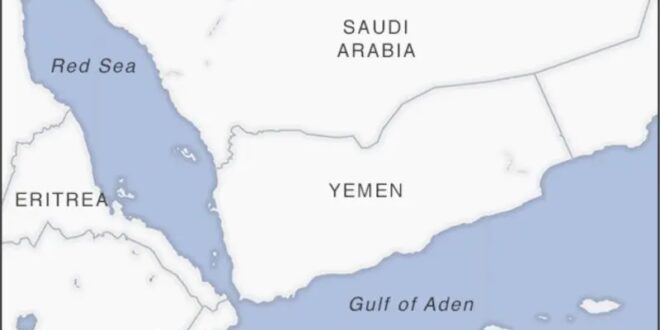Yemen’s Houthi militia group, which controls the capital, Sana’a and parts of Yemen’s Red Sea coast, has attacked another ship in the Gulf of Aden, following a rash of attacks over the past several weeks. Iran’s supreme leader is encouraging the Houthis, which serve as an Iranian proxy in the region, to continue attacking U.S. and western ships. Such attacks threaten to further exacerbate tensions in the region and the fragile economies of many regional states.
Yemen’s Houthis attacked a Maltese-flagged vessel in the Gulf of Aden Tuesday, following a rash of attacks on international shipping in recent days. Iran’s supreme leader Ali Khamenei, who supports the Houthis, urged them to “continue their attacks.”
Yahya Saria, spokesman for the Houthis’ military forces, said they would continue attacking U.S. and British ships and seek revenge for U.S. and British attacks on their forces in recent days.
He says that [the Houthis’] naval forces carried out an attack targeting a U.S. ship in the Gulf of Aden using sea missiles and resulting in a direct and precise hit. He says that the Houthis consider all U.S. and British ships legitimate enemy targets after they attacked Yemen and that no new attack will go without a response.
Yemeni analyst Salah al-Aghbar told Sky News Arabia that Iran is “trying to assert that the Red Sea is a vital waterway to it and that it can close both the Red Sea and the Strait of Hormuz during a conflict, if the need should arise.”
Mehrdad Khonsari, a London-based Iranian analyst and former diplomat, tells VOA that Tehran is “not capable of closing either the Red Sea or the Strait of Hormuz and that it is just using rhetoric for propaganda purposes.”
He argues that the Houthis are a useful proxy, but mostly a diversion from more important Iranian assets like Hezbollah.
“Iranians, whilst they are cautious not to escalate the combat in a way that would involve them, or their primary proxy group, Hezbollah, they see the Houthis as a vehicle for increasing pressures on the world community without actually getting them involved in some kind of direct conflict with the west,” he said. “Now, if the Israelis were to attack Hezbollah, then obviously Iranians would become involved, but that is the kind of scenario that they would like to avoid.”
Khonsari adds that Houthi attacks “dissuade Israel from going after Hezbollah and act as a very convenient diversion for the Iranians to direct attention away from more important areas to it, like the Lebanese border with Israel and Hezbollah bases, which are critical for the survival of Iranian regional policy.
If Hezbollah were attacked and degraded by Israel, he says, this would mean the collapse of Iranian regional policy and proxies, whereas degrading the Houthis or Hamas does not affect overall Iranian policy to a great extent.
Washington-based Gulf analyst Theodore Karasik tells VOA that U.S. and British attacks on the Houthis are clearly intended to degrade their military capabilities.
“These strikes are important and meant to degrade the capacity of the Houthis, who are being backed by Iran, and that evidence is undeniable,” he said. “They are clearly linked, and consequently, such activity is going to continue to have an impact because of the back-and-forth and escalation process.”
Karasik also insists that there is diplomatic wrangling taking place behind the scenes through various negotiating channels between key Gulf states, with lots of what he calls wheeling and dealing.
Yemeni analyst Fawaz Nasr, however, disagrees, telling Arab media that the Saudi-supported Yemeni government based in Aden, which opposes the Houthis, stresses that the U.S. and British attacks on the Houthis “will have no effect whatsoever unless the Houthis are dislodged from territories that they control,” including key parts of Yemen’s Red Sea coastline.
Meanwhile, as many western ships and cargo vessels change course away from the Red Sea and Suez Canal for the longer Horn of Africa route, Egyptian President Abdel Fattah al-Sisi met with officials with the French government’s shipping authority to try to reassure Western shippers that the Suez Canal is safe.
 Eurasia Press & News
Eurasia Press & News



